Have you ever experienced stomach pain after quitting alcohol? It’s a common occurrence, but understanding why it happens and how to manage it can be a significant step towards successfully navigating alcohol withdrawal. Ready to gain some insights? Let’s dive in.
Short Summary
-
Understand the causes of stomach pain after quitting alcohol to motivate recovery.
-
Take proactive steps towards managing withdrawal symptoms and preventing complications.
-
Find the right treatment option that works best for you, including inpatient/outpatient programs & therapy/support groups, to help stay sober.
Understanding Stomach Pain After Quitting Alcohol
When overcoming alcohol addiction, withdrawal symptoms are a common hurdle. Stomach pain, a frequent companion of these symptoms, can be disconcerting and uncomfortable. But what causes this discomfort? The answer lies in two primary culprits: gastrointestinal distress and alcoholic gastritis.
Gastrointestinal distress encompasses symptoms such as nausea, abdominal pain, and cramping. Alcohol withdrawal often triggers these symptoms, and in severe cases vomiting, fever, jaundice, and severe stomach pain can occur.
Alcoholic gastritis, on the other hand, results from a damaged stomach lining, leaving it exposed to digestive enzymes and stomach acids. This exposure can lead to discomfort and stomach pain.
Gastrointestinal Distress and Alcohol Withdrawal
Alcohol withdrawal is a cause of gastrointestinal distress. It is a common symptom experienced by those affected. The discomfort can range from mild to severe, with nausea, abdominal pain, and cramping as typical manifestations. These symptoms can appear a few hours after your last drink and might worsen if not properly managed.
To tackle these unpleasant effects, consider maintaining a balanced diet, staying well-hydrated, and using over-the-counter remedies. Recognizing when you need medical help is also crucial. In fact, managing these symptoms effectively can make a significant difference in your withdrawal journey, making it a less daunting experience.
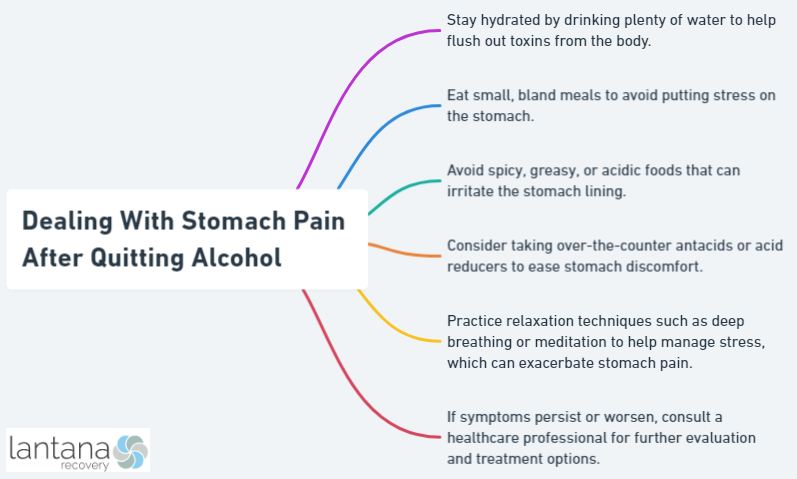
Alcoholic Gastritis: A Major Cause of Stomach Pain
Alcoholic gastritis is another key player in the drama of stomach pain during alcohol withdrawal. When you consume alcohol, gastritis can occur, leading to sudden inflammation of the stomach lining. This condition can be quite painful and is often a significant source of discomfort during alcohol withdrawal.
If you’re experiencing alcoholic gastritis, you may be familiar with the intense stomach pain and other related symptoms that call for immediate medical attention. When gastritis symptoms intertwine with severe withdrawal signs like high blood pressure, depression, or elevated body temperature, it becomes crucial to consider seeking expert outpatient treatment in Charleston. Taking the initiative to address these symptoms under professional care can significantly ease your withdrawal journey, making it more manageable and less distressing.
The Impact of Alcohol on the Digestive System
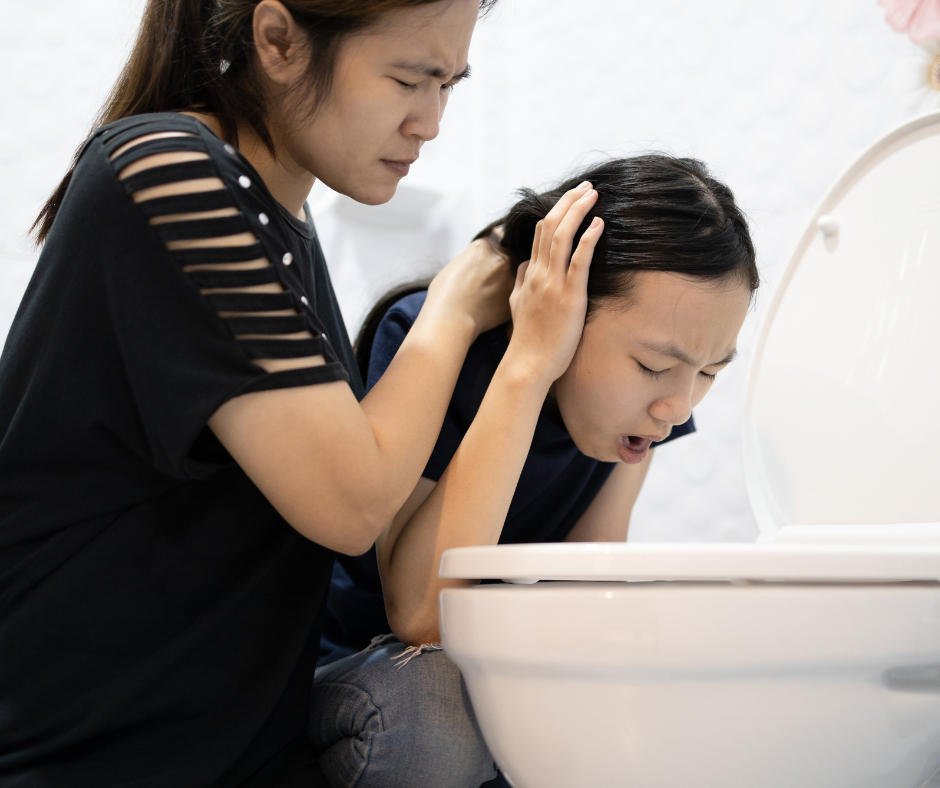
The relationship between alcohol and the digestive system is far from harmonious. Long-term alcohol consumption can have a detrimental effect on your digestive health, notably damaging the stomach lining and increasing the risk of stomach ulcers.
The persistent assault of alcohol on the stomach lining can lead to conditions like gastritis and increase the formation of stomach ulcers. The liver, an essential player in breaking down alcohol and eliminating toxins, can also bear the brunt of alcohol abuse.
Understanding these impacts can be a significant motivator towards reducing alcohol consumption and taking steps towards recovery.
How Alcohol Irritates the Stomach Lining
Alcohol can play the role of an unwelcome houseguest in your stomach, causing irritation and damage to the stomach lining. Over time, alcohol can erode the stomach lining, disrupt the production of mucus that lines the stomach, and interfere with gastric acid secretion and the activity of the muscles surrounding the stomach.
“Mounting evidence shows that alcohol induces intestinal inflammation through various pathways, including changes in intestinal microbiota composition and function, increased permeability of the intestinal mucosa, and disruptions of the immune system of the intestinal mucosa.” (Alcohol and Gut-Derived Inflammation, Bishehsari et al., 2017)
This disruption results in an acid that irritates the stomach lining, causing gastritis and contributing to the discomfort experienced during alcohol withdrawal. Managing this irritation can be a significant part of overcoming alcohol withdrawal and maintaining long-term sobriety.
Stomach Ulcers and Alcohol Use Disorder
Alcohol use disorder can significantly increase your risk of developing stomach ulcers. These ulcers, painful sores that form on the lining of your stomach, can cause severe discomfort and further complicate the process of alcohol withdrawal.
Recognizing the link between alcohol use disorder and stomach ulcers can be an important part of managing your withdrawal symptoms. By understanding the potential risks, you can take proactive steps towards recovery and ensure you’re equipped to handle any complications that might arise.
Alcohol Withdrawal Timeline and Stomach Pain
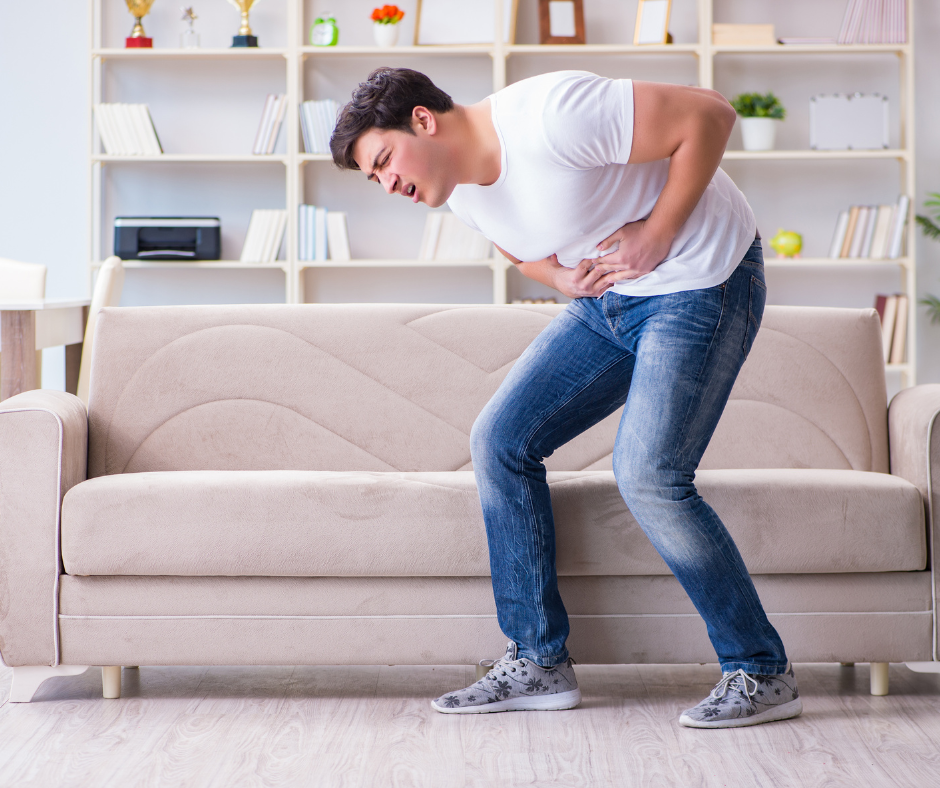
The alcohol withdrawal timeline is unique for each individual, but generally, symptoms start to manifest within 8 hours of the last drink and may last up to 7-10 days. During this period, stomach pain can present itself during both the early and late stages of withdrawal.
It’s essential to be aware of these timelines and understand that experiencing stomach pain is a part of the withdrawal process. This knowledge can help you prepare for withdrawal and equip yourself with coping mechanisms to handle the discomfort effectively.
Early Stage Symptoms
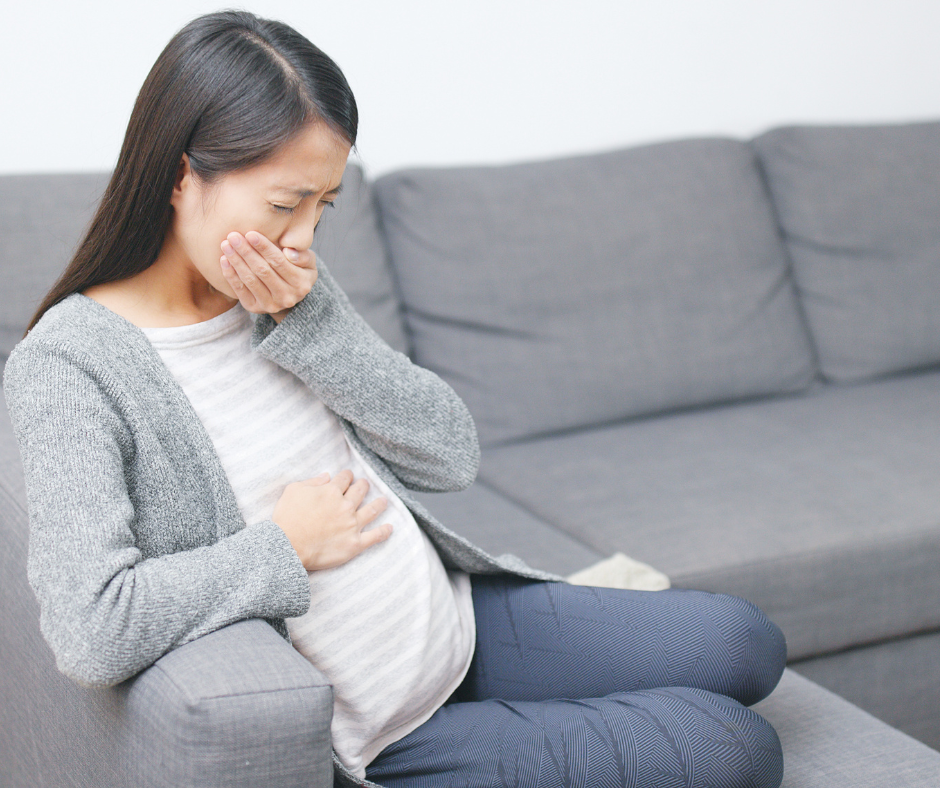
The early stage of alcohol withdrawal can bring about a host of symptoms, including anxiety, nausea, sweating, trouble sleeping, and brain fog. How long does brain fog last after quitting alcohol, you might ask. Well the answer depends on a variety of factors including your brain chemistry, intensity of alcohol dependence, amount of alcohol last consumed, etc.
These symptoms, which are indicative of alcohol withdrawal syndrome, can start just a few hours after your last drink and may include stomach discomfort, loss of appetite, headaches, sweating, nausea, or vomiting. If you are experiencing alcohol withdrawal symptoms, it is essential to seek medical help to ensure a safe recovery process.
Recognizing these early symptoms is a crucial step in managing your alcohol withdrawal. It can help you understand what to expect during this period and provide you with the necessary tools to cope with these symptoms effectively.
Late Stage Symptoms
As alcohol withdrawal progresses, more severe symptoms can emerge. These can include conditions such as delirium tremens, seizures, and hallucinations. Alongside these, stomach pain can persist and may be accompanied by potential complications like stomach bleeding.
Understanding that these intense withdrawal symptoms are a result of the brain remaining highly alert and active during this time can help you navigate your withdrawal journey. Recognizing these symptoms and seeking medical help when necessary can significantly improve your withdrawal experience.
Managing Stomach Pain During Alcohol Detox
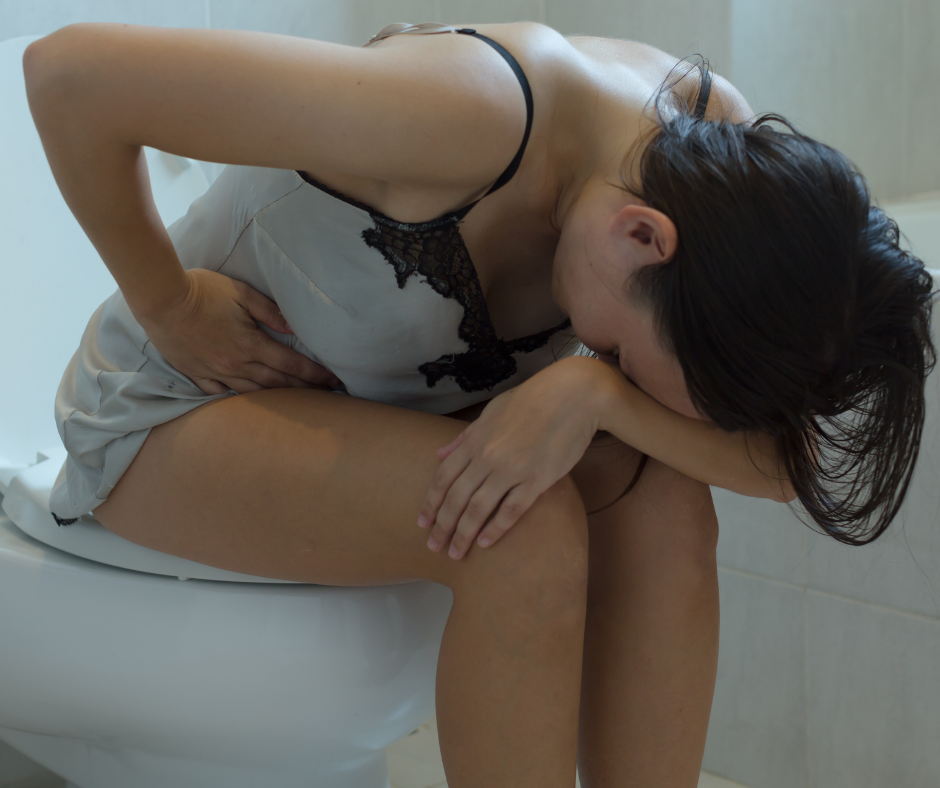
Managing stomach pain during alcohol detox can be a significant challenge, but with the right strategies, it can be made more manageable. These strategies include abstaining from foods and drinks that can irritate the stomach and consuming foods that can help the body heal and replenish nutrients.
The journey of alcohol detoxification should not be a lonely one. Acquiring the right tools and strategies can not only help manage the discomfort, but also boost your confidence and determination to see the detox process through.
Diet and Hydration Tips
Maintaining a healthy diet and staying hydrated is a crucial part of managing stomach pain during alcohol withdrawal. Eating small, frequent meals that are rich in nutrients, and drinking plenty of fluids, especially those with electrolytes, can help you manage stomach pain.
Navigating through personalized addiction rehabilitation, sticking to the routine of three meals a day, and resisting food cravings might present its challenges, but it remains a vital aspect of the detox process. By incorporating foods rich in H20 and electrolytes into your diet, you can ensure your body receives essential nutrients and effectively cope with any stomach discomfort that arises.
Over-the-Counter Remedies
Over-the-counter remedies like antacids, Pepto Bismol, Gas-X, Gaviscon, and Tums can provide relief from stomach pain during alcohol detox. Antacids can help neutralize stomach acid and provide relief from uncomfortable symptoms like heartburn, indigestion, and acid reflux.
Pepto Bismol can ease stomach pain and cramping, Gas-X can help reduce bloating and discomfort, Gaviscon can help reduce acid reflux, and Tums can help neutralize stomach acid. All of these remedies can provide relief for your digestive needs during alcohol detox.
When to Seek Medical Help
While dietary changes and over-the-counter remedies can often help manage stomach pain during alcohol detox, there are instances where medical attention is required. If the pain is severe or accompanied by other symptoms such as vomiting, fever, or jaundice, seeking medical help is critical.
Being aware of the signs of a severe withdrawal symptom such as vomiting, fever, jaundice, and severe stomach pain is also crucial. If any of these symptoms are present, seeking medical help right away is vital.
Treatment Options for Alcohol Withdrawal Symptoms

There are several treatment options available to manage alcohol withdrawal symptoms. These include medications, inpatient treatment centers, and other treatment options such as 12-step programs, cognitive behavioral therapy, and referrals to local programs. These options can help treat alcohol withdrawal and guide you on your journey towards recovery.
Choosing the right treatment option for alcohol withdrawal syndrome can be an essential step in managing your alcohol withdrawal symptoms and successfully overcoming alcohol addiction. Each individual’s journey is unique, and it’s crucial to find a treatment option that works best for you.
Inpatient Detox and Rehab
Inpatient detox and rehab is a highly beneficial treatment program for individuals with severe alcohol addiction. It involves a stay at a facility where patients can receive expert medical care and counseling to help them manage their withdrawal symptoms and begin the journey of recovery.
Inpatient detox and rehab offer a secure and encouraging atmosphere for individuals to handle their withdrawal symptoms and start the journey of recovery. Patients get 24-hour medical care and guidance, and are able to concentrate exclusively on their healing without the distractions of everyday life.
Outpatient Programs
Outpatient programs can be a great treatment option for individuals with milder alcohol withdrawal symptoms. These programs allow you to attend regular therapy sessions and support groups while still living at home and maintaining your daily routine.
It’s a balance that allows you to address your alcohol withdrawal symptoms while not completely disrupting your everyday life. These programs provide the flexibility to continue with your daily life while receiving treatment.
Therapy and Support Groups
Therapy and support groups play a significant role in addressing the psychological aspects of alcohol addiction and withdrawal such as , anxiety after quitting drinking. They can provide a sense of community and support, reduce feelings of isolation, and teach individuals recovery skills from others who have gone through similar experiences.
Group therapy can offer a feeling of belonging and support, diminish feelings of loneliness, and help individuals gain coping techniques and recovery abilities from others who have gone through comparable experiences. It can also be beneficial in keeping sobriety and treating co-occurring mental health disorders.
Summary
In conclusion, stomach pain following the cessation of alcohol consumption is a common symptom of alcohol withdrawal. Understanding its causes and knowing how to manage it effectively can significantly smoothen your journey towards recovery. Whether it’s through dietary changes, over-the-counter remedies, or professional treatment, there are numerous options available to help you overcome this hurdle. Remember, every step you take towards managing your withdrawal symptoms is a step closer to a healthier and alcohol-free life.
Frequently Asked Questions
Does your stomach hurt when you stop drinking?
When someone stops drinking, their body goes into a state of physical and emotional stress which can cause them to experience abdominal pain and nausea. This can even result in stomach aches and associated heart problems.
These physical symptoms can be difficult to manage, but there are ways to cope. Exercise, relaxation techniques, and a healthy diet can all help reduce the severity of the symptoms. Additionally, talking to a doctor or therapist is a good idea.
What happens to your digestive system when you stop drinking alcohol?
Stopping drinking alcohol leads to more energy, better digestion, and reduced bloating and weight gain.
Its effects can also irritate the intestines and cause pancreatitis.
How can I manage stomach pain during alcohol detox?
Manage your stomach pain during alcohol detox by staying hydrated, eating healthily, using over-the-counter remedies, and seeking medical help when needed.
Staying hydrated is essential for managing stomach pain during alcohol detox. Drink plenty of water throughout the day and avoid sugary drinks and caffeine. Eating healthily is also important. Choose foods that are high in fiber and protein, and avoid processed foods.
What are the early and late stage symptoms of alcohol withdrawal?
Alcohol withdrawal can manifest as anxiety, nausea, sweating, and trouble sleeping in its early stages, with more severe conditions such as delirium tremens, seizures, and hallucinations presenting later on.
These symptoms can range from mild to severe, and can be life-threatening if not treated properly. It is important to seek medical attention if you are experiencing any of these symptoms. Withdrawal can be managed with medications and other treatments, and the severity of symptoms can be reduced.
What is the difference between inpatient and outpatient programs?
Inpatient programs require a stay at a facility with 24-hour medical care and guidance, whereas outpatient programs provide individuals the flexibility to attend therapy sessions and support groups while living at home.
Outpatient programs allow individuals to maintain their daily routines while still receiving the necessary treatment and support. This can be beneficial for those who have family or work obligations that prevent them from committing to an inpatient program.









